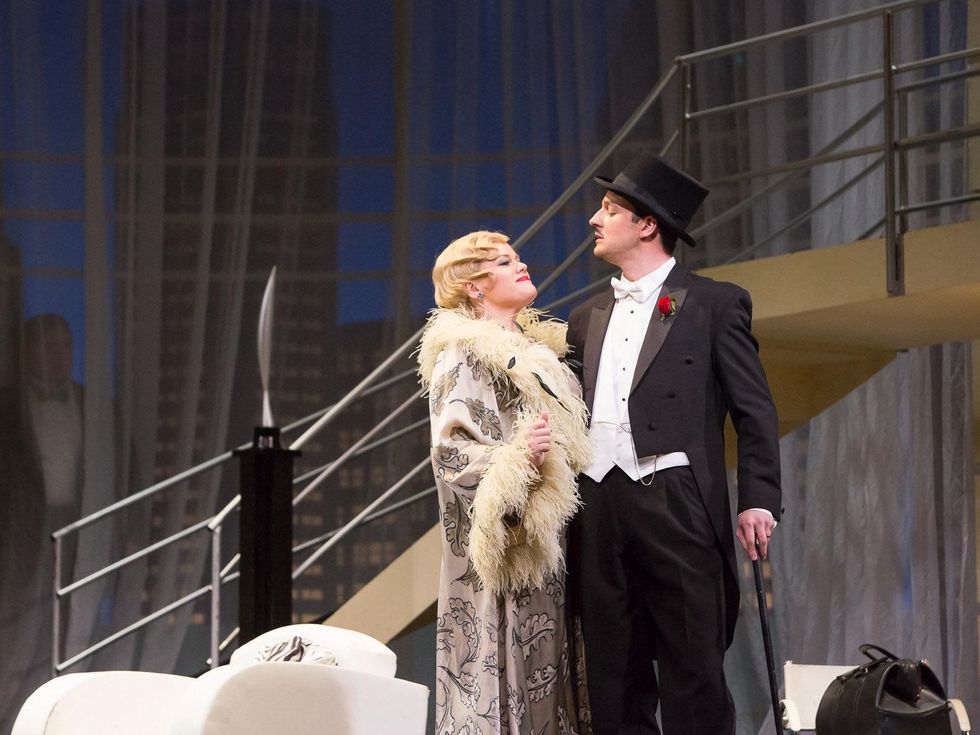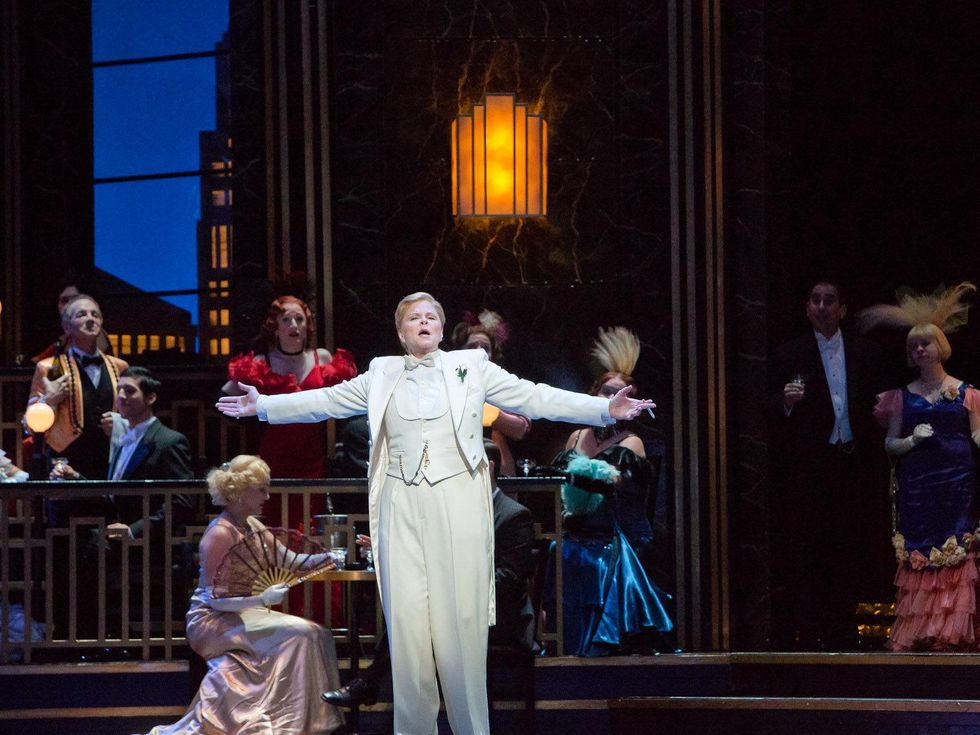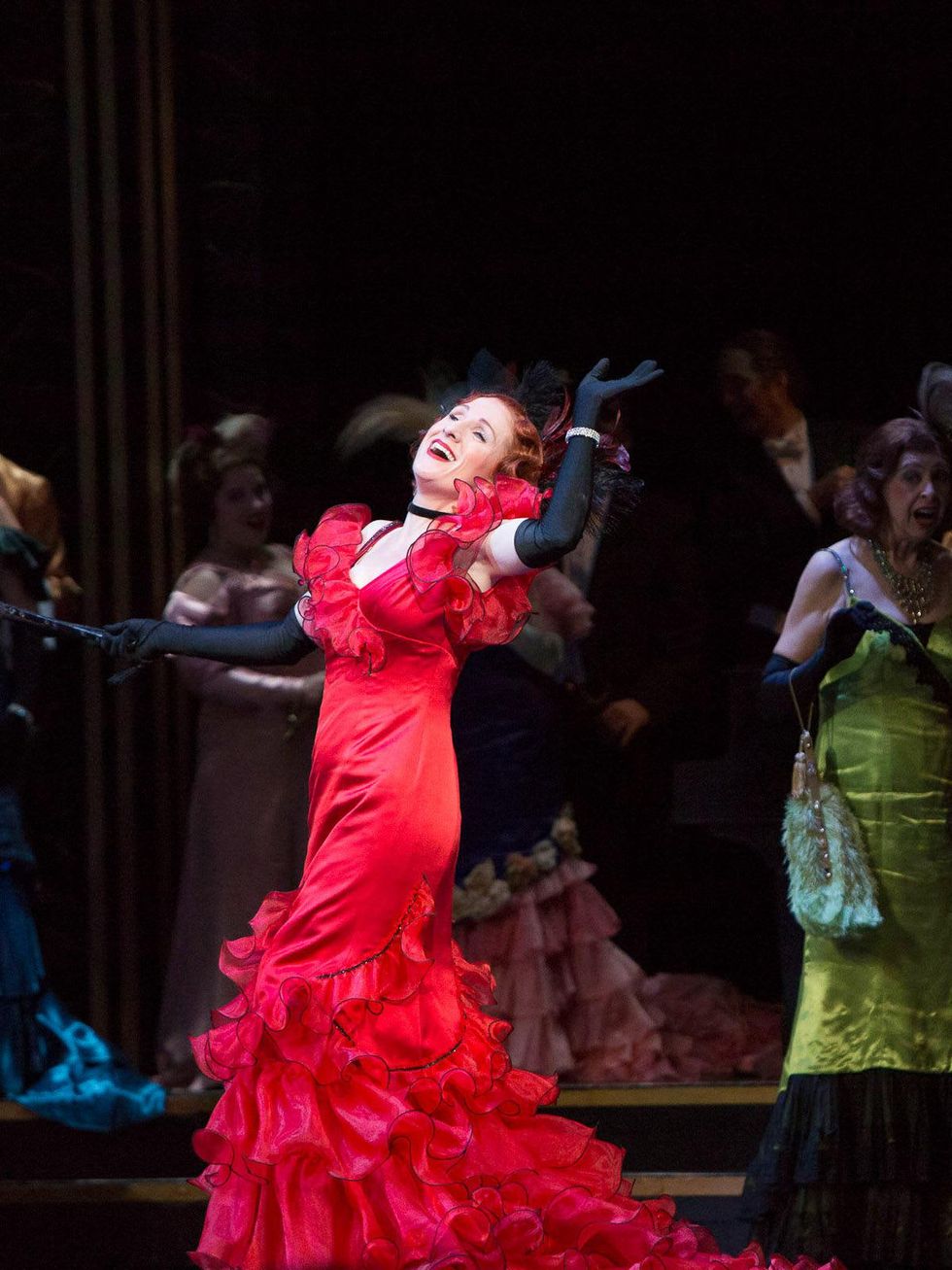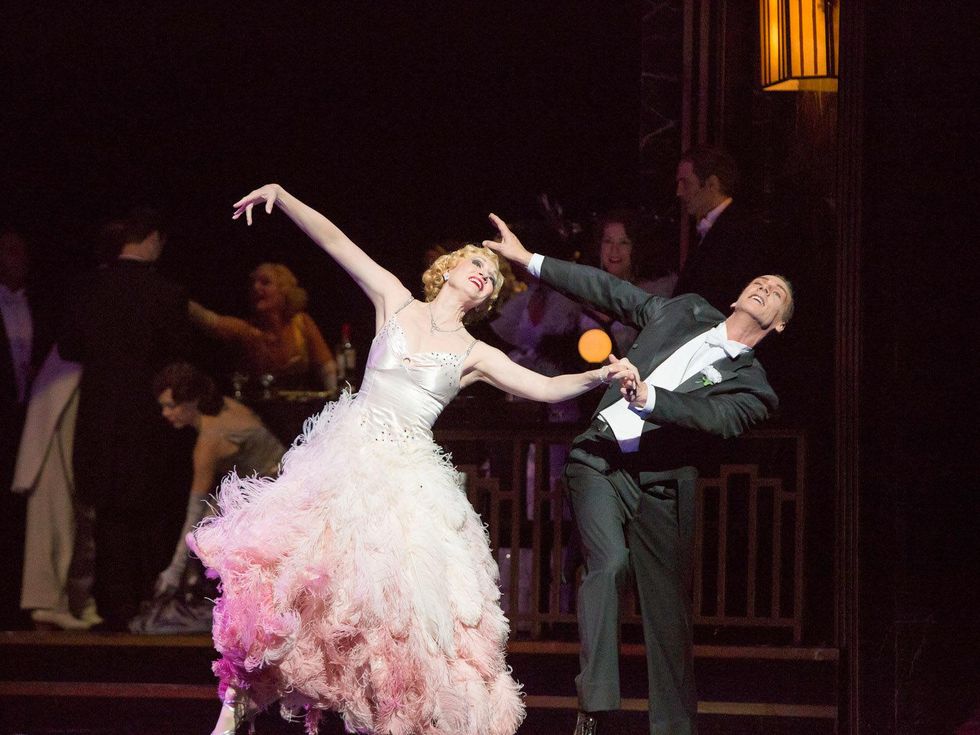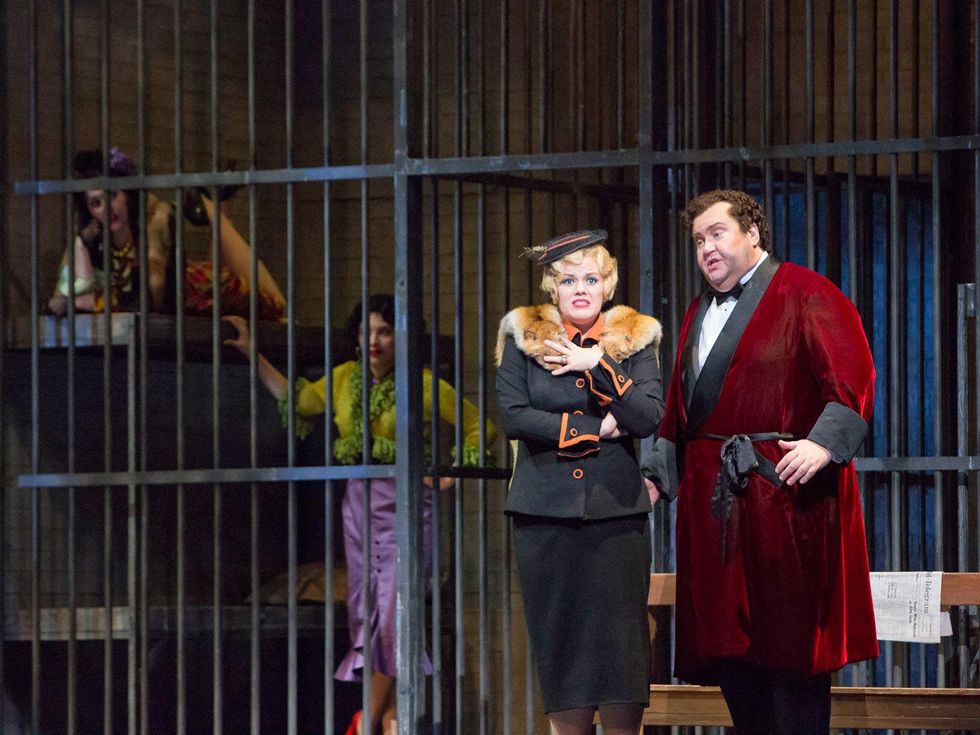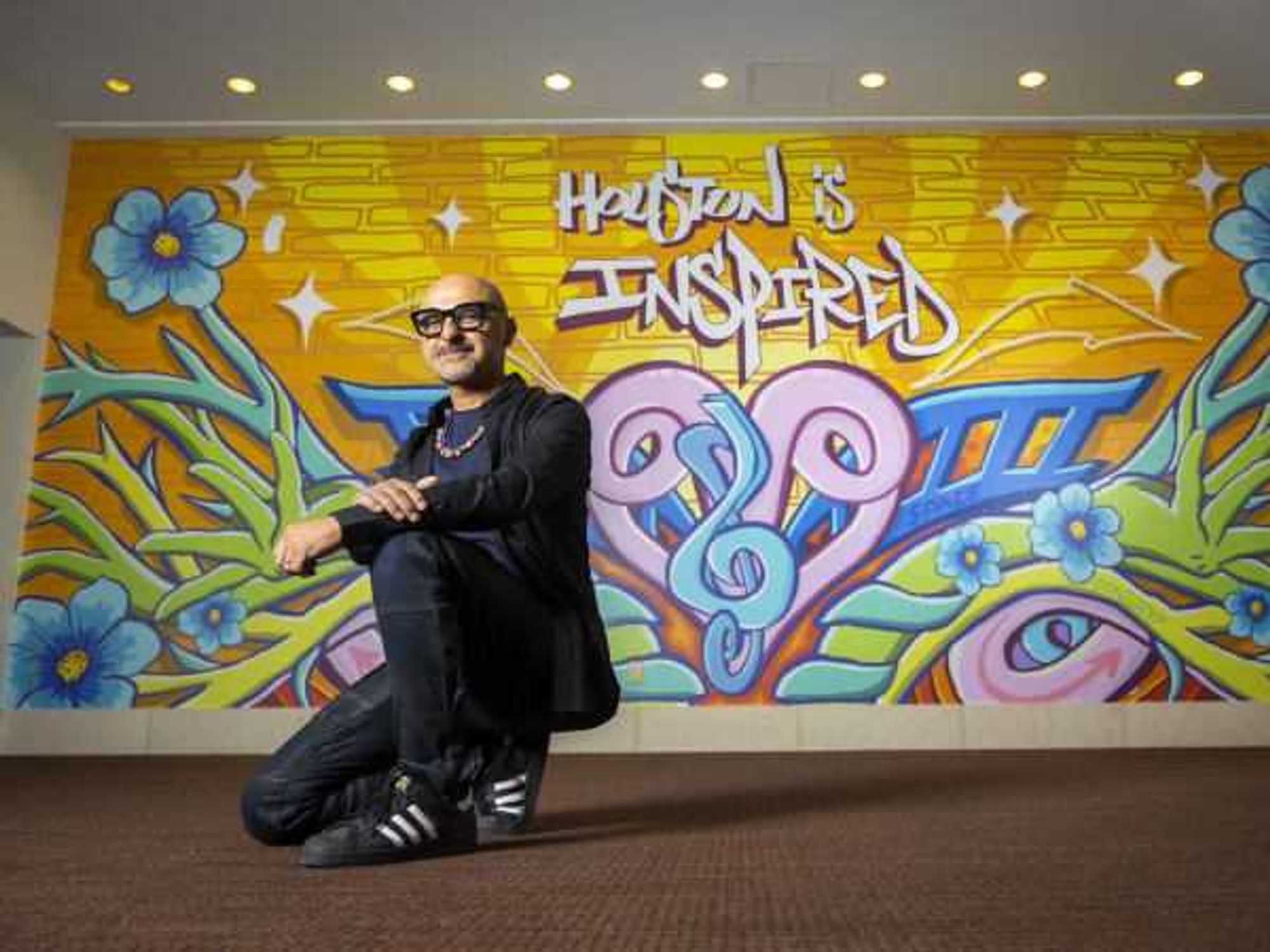The review is in
The funny opera: A silly and sumptuous Die Fledermaus shows HGO isn't afraid to laugh
Lusty, laughable, even licentious, Johan Strauss II’s Die Fledermaus is an operetta everyone should put on their bucket list. Houston Grand Opera’s second production of the season has its highpoints, to be sure.
At other times it has trouble taking off, making it seem a bit more like Deflated Mouse.
If you’re not into the late 19th century Viennese “life is short, so drink plenty of champagne” sensibility, blended in this production with Richard Roberts’ impressive American 1930s Chrysler Building noir ambiance (the best way I can describe it), this might not be the operetta for you. If you’re willing to relax and let those endless waltzes kind of wash over you, however, you might understand the merits of this popular oddity.
There is some inspired singing, particularly from Liam Bonner, whose pretense of being French is one of the funnier things you’ll witness in HGO’s season.
It’s great to see that HGO is giving plenty of attention to choreography. Last week’s Aïda featured elegant ballets by Dominic Walsh. This Fledermaus has several impressive spectacles by choreographer and associate director Daniel Pelzig, including a grand waltz, a camp Hungarian bellhop csárdás, and a sweeping Astaire-and-Rogers routine danced confidently by Philip Broomhead and Krissy Richmond. These were, for me, some of the finest moments of the evening.
And there is some inspired singing, too, particularly from baritone Liam Bonner as Eisenstein, whose pretense of being French is one of the funnier things you’ll witness in HGO’s current season. Just as humorous is tenor Anthony Dean Griffey as Alfredo (a far, far cry from his terrifying portrayal of the lead character in HGO’s Peter Grimes) and baritone Samuel Schultz as the conniving yet ever-elegant Dr. Falke.
It is frustrating, though, that Houston Grand Opera has not resolved the microphone problems the company had with last year’s production of Show Boat. The written program indicates that “electronic sound enhancement is used only with spoken dialogue,” or for musicals, or at the composer’s direction. This production of Die Fledermaus, however, requires a kind of constant calibration by listeners.
The amplified dialogue is often unintelligible (at least from where I was sitting, in the center orchestra) and when the un-amplified singing proceeds, it is necessary to read the super-titles if you want to know the text. I looked down a few times, to see if I could understand it without reading, and it was challenging.
Call me crazy, but I don’t believe English-speaking viewers should require super-titles for texts being sung in English. This is never a problem at Theater Under the Stars. Why should an operetta be any different?
Don't Leave
Another problem is the English singing translation by David Pountney and Leonard Hancock, which gets old really fast. The hokey rhyming includes exclamations like “You got what you deserve! You have an awful nerve!” and “Why waste your precious voice? You have no other choice.”
By the end of the first act, the prosody descends to clumsiness. “Does the situation here, appear to you not quite clear?” By the third act, it’s simply maddening.
Not everyone could sit it out. I noticed that the row where I was seated, Q, was nearly empty by the third act. This is really too bad, since the act contained what might be the most amusing anachronisms and best additional dialogue by director Lindy Hume. HGO even pokes fun at itself here. “Who the hell is Peter Grimes? " asked actor Jason Graae as Frosch.
Call me crazy, but I don’t believe English-speaking viewers should require super-titles for texts being sung in English.
The orchestra briefly inserted the march from last week’s Aïda into the score, along with Take Me Out to the Ball Game, and Alfredo sang a bit of an ode to Dolly Parton with his impromptu rendition of Nine to Five.
The women in the cast didn’t really shine in Friday's opening night. Soprano Wendy Bryn Harmer was Rosalinde. Aside from that, I don’t have much more to say about her.
And I suppose I’m just one of those opera-goers who cannot “get” Susan Graham, a singer some fans would elevate to the god realm. In previous seasons, I neither appreciated her lukewarm performance in Handel’s Xerxes, nor her stormy portrayal of The Composer in Ariadne auf Naxos. As Prince Orlovsky, her slapstick in the À chacun son goût aria isn’t bad, but it’s hard to tell if she’s channeling Marlene Dietrich or just letting the costume do the work. The aria is one of the great ironic anthems of polyamory. Friday night, I noticed the dancing boys around Graham more than her interpretation of the song.
Soprano Laura Claycomb, as Adele, was as unremarkable as she was in HGO’s 2011 Ariadne auf Naxos. Most of the time it sounded as if she had a toaster cozy over her head, giving her the effect of being continuously muffled. This might have been a problem of shifting between amplified speaking and the traditional projection of singing.
Austrian Thomas Rösner, making his HGO debut, is the charismatic, hair-flinging conductor who kept the whole thing on course while managing to pull a vivid performance out of the orchestra musicians.
